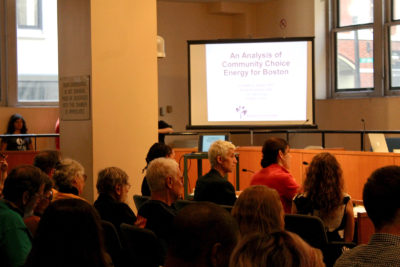
The Boston City Council held a hearing on Tuesday to discuss an order authorizing Boston to adopt Community Choice Energy, which addresses climate change, renewable energy sources and stable prices.
The proposal, co-sponsored by City Council President Michelle Wu and District 6 Rep. Matt O’Malley, would authorize the City — rather than the current provider Eversource — to decide what forms of energy to supply residents with. This would potentially switch all residents on basic service to clean energy, Brookline community planner Maria Morelli said.
O’Malley said during the meeting that he and Wu initially filed the hearing order on Jan. 25, and two months ago filed the authorization for CCE.
Energy would still be billed and distributed through Eversource, Boston’s current utility provider, and residents would be able to opt out of of the program at any time, Morelli said.
O’Malley said there is a lack of leadership in the capital in relation to dealing with climate change. As a result, it comes down to cities and towns to lead the way.
“We have seen this work tremendously successfully 150 in 351 cities and towns throughout the Commonwealth,” O’Malley said. “We know that there are some tools and mechanisms in place to protect ratepayers while we can also grow our renewable energy sources for our energy by five percent, which will have an incredible impact.”
The hearing featured a panel by chief of environment, energy and open space Austin Blackmon, who brought up the administration’s concerns regarding the costs of implementation.
Blackmon said the administration has been working with one vendor, an independent energy consulting company called Colonial Power Group, Inc., which has shown that monetary rates under CCE are one percent higher than the current Eversource rate.
“We believe, [that] although … this could be a very excellent way for the City of Boston to move forward, we do have concerns,” Blackmon said. “[Our concerns are] around the cost of implementation as well as the cost of differential in terms of the prices we have seen and solicited in terms of the vendors who have worked on similar aggregations throughout the state. This is a particular concern for low income residents.”
Blackmon expressed concern over the cost of hiring five full-time employees for two months during CCE’s implementation. The administration will “have some continuing conversations” with their legal department, Blackmon said.
“We hope we can move forward quickly with a working session following the hearing today,” Blackmon said.
Elizabeth Stanton, clinical director and senior economist at Tufts University’s Applied Economics Clinic, said during the meeting that her clinic released a report and policy brief that evaluated the proposal for CCE.
“We focused our analysis on towns within Eversource territory that have adopted a policy similar to that being considered for Boston,” Stanton said. “All of the towns in the city shown here procure five percent additional Massachusetts class one renewables for their default electric service. Almost all of these towns are saving money with the program, except for Winchester.”
Stanton said the clinic predicts that, “due to the city’s size, Boston will be able to fetch a competitive price that is in line with or cheaper than what these other towns are getting.”
Several Boston residents expressed support for CCE, and said they were concerned about the pushback they heard from Blackmon throughout the meeting.
Loie Hayes, 60, of Mission Hill, said she is a board member for the Boston Climate Action Network, and that she noticed inconsistencies in Blackmon’s argument.
“He said every bid we’ve gotten from Colonial Power has been higher than Eversource, when his own employees met with us and showed us numbers that were less than Eversource’s,” Hayes said. “Yes, they’ve gotten seven bids from them and maybe only one came in lower, but they were very excited, his employees, at that point, to say, ‘Yes, we can get even six percent without increasing costs.’”
Carol Oldham, 46, of Jamaica Plain, and the executive director of the Massachusetts Climate Action Network, said CCE is similar to buying in bulk for clean energy, therefore allowing for every resident to have an increased amount of it in their mix.
“When I moved to Boston, I moved from Brookline and when I got here, my supplier, my energy supplier, was automatically Eversource,” Oldham said. “If you pass Community Choice Energy, your energy supplier is automatically the City of Boston. And the City of Boston can make a choice about what they want their energy mix to look like.”
Sara Driscoll, 70, of Jamaica Plain, said she is also a member of the BCAN, and that she is concerned about Blackmon’s hesitance to promote CCE.
“It’s an authorization that the mayor [Boston Mayor Martin Walsh] has to approve, and that’s where we’re coming up a little against a wall,” Driscoll said. “His Chief of Energy and Environment is not highly supportive of Community Choice Energy. He’s fearful of raising prices, but in fact all research has shown that prices either reduce or stabilize, so it’s frustrating.”
Isabel is a sophomore in the College of Communication and the Opinion Editor for Fall 2018. Follow her on Twitter @isabelcowens.



